|
This story appears in ESPN The Magazine's April 25 NFL Draft Issue. Subscribe today! ROBERT NKEMDICHE WANTS a pet panther. That's how he plans to treat himself when he signs his rookie contract. He wants to take care of his family, and he wants to buy a panther. Right now, on this March afternoon, he's at Handy Andy, a roadside barbecue joint in Oxford, Mississippi. They know him here. A few months ago -- before he fell out of a fourth-story hotel room window, was hospitalized, was charged with possession of pot and was suspended for the Sugar Bowl, ending an All-America career as a defensive tackle at Ole Miss -- he would walk in and simply wave to the cashier to begin his order: two double bacon burgers with pepper jack cheese and a Mountain Dew. But this is his first time back in a while, so he orders at the register, then makes his way to a table in the back, away from most patrons. Soon Nkemdiche is quadruple-tasking. He's chugging. "Something about Mountain Dew, man." He's eavesdropping on a conversation between two 80-something men. "I like old people. There's no pretentiousness." He's discussing his admiration for Pink Floyd. "Division Bell. It speaks to me." And he's watching Instagram videos of domesticated panthers. He likes the black ones, likes how their eyes glow. He stares at shots of people playing with panthers, wrestling with them as if they were dogs, nudging faces, fearless when they open their mouths. "It's sick." It's insane. "No, it's not. They're like cats." Can't he see the headline? Visitor Mauled by NFL Star Robert Nkemdiche's Pet Panther. "If someone comes over and is scared, I'll put the panther away." It's not that Nkemdiche would be a pioneer in housing a panther. It's that the panther is yet another thing. Robert Nkemdiche is 21 years old, jacked, polite and hardworking. But he's a creative spirit entering a world where creative spirits are looked upon with suspicion and disdain. He was once considered a top-five pick. Now nobody knows. For his part, Nkemdiche can't fathom how a panther might be an issue, just as he can't understand why falling out of a hotel room -- "one mistake" -- coupled with concern over the influence of his older brother Denzel might end up costing him millions. Nkemdiche is more than an immensely talented guy with a mild self-destructive streak. He's a test case of what happens when a weird guy meets a weird process.  THE DAY BEFORE Nkemdiche's lunch at Handy Andy, scouts from all 32 teams spent the morning with him at Ole Miss' pro day. He arrived at 6:30 a.m., four hours early, and immediately irritated scouts by refusing to run the shuttle drill. For an inherent people pleaser, Nkemdiche has a strange habit of annoying those charged with evaluating him. A month earlier at the NFL combine, he earned universally awful reviews. He seemed evasive in team interviews -- and skipped the shuttle drill there too. In games, of course, 6-foot-3, 294-pound Nkemdiche is often so athletic that he's "an interior Julius Peppers," as one GM says. Nkemdiche didn't think running between cones -- one of those "February drills," as Bill Belichick dismissed it last year -- had anything to do with a violent and simple question: Can he annihilate an NFL opponent's spirit and soul? Let's face it: The draft evaluation process is out of control. In free agency, the Texans gave quarterback Brock Osweiler $37 million guaranteed -- and head coach Bill O'Brien never met him. But in the draft, teams look at years of video, piles of dirt and hours logged at the combine, at pro days, at private workouts, in exclusive interviews, and at complete medical and psychological records. Teams rationalize the hoarding of information and trampling of privacy as an attempt to mitigate risk. But no team, not even the Browns, is teetering on insolvency because of bad drafts. Even the architects of depleted rosters -- Trent Baalke, Thomas Dimitroff, Jerry Reese -- who helped contribute to the dismissal of head coaches still have jobs. The entire evaluation process has dissolved into theater, and the biggest risk is assumed by the prospects. Only the prospects. Still, Nkemdiche failed to understand -- or said to hell with -- the idea that scouts are not accustomed to being told no. So after he politely declined to run the shuttle drill, a few scouts and coaches exacted revenge. During another drill, in which Nkemdiche slalomed between bags and punched dummies, two coaches made him go longer than other players, working him in back to back rather than in a rotation. "They tried to break me." He refused to be broken. He beat the hell out of those bags, and at least two team representatives left impressed, not because Nkemdiche had jumped through hoops but because his intensity reminded them of what they saw on the only thing that should matter but one that always seems undervalued during the draft process: game film. 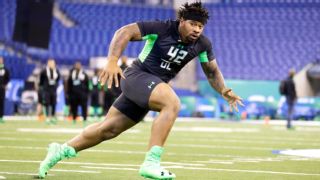 A FEW HOURS after watching videos of panthers, Nkemdiche goes bowling. As with most of his forays in life, his methodology is unorthodox. In size 14 shoes, he hunches over and almost crawls to the stripe, like a cat tiptoeing to prey. He throws like a softball pitcher, the ball spinning and floating before landing halfway down the lane with a hammering thud so loud it summons an increased respect for wood. In terms of pins, he's hit or miss. Today, mostly miss. Nkemdiche plops down on the bench and flaps his arms in the air. A nearby newborn starts crying. Ravon Coleman, one of Nkemdiche's three friends bowling today, ribs him. "You made that baby cry," she says. With short dreads filtered through a black headband, Nkemdiche looks like a sax player in a jazz band. Which he is, sort of. In college, he decided to pick up the sax for the first time since middle school. Last November, Morgan Freeman and Nkemdiche ended up at a mutual friend's house for Thanksgiving, and after learning that Nkem-diche played the instrument, Freeman invited him to jam at his club, Ground Zero, in Clarksdale. Nkem-diche appeared onstage with a friend's band days after he'd fallen out of the hotel. He gazed into the crowd for the actor, seeking approval. Freeman was hunched in his chair, arms folded, chin dropped to his chest. "Fast asleep." A huge, muted TV tuned to a draft preview show hangs over the bowling lane. Soon the debate turns to how far Nkemdiche might fall because of "character concerns," that catchall phrase so popular this time of year. Nkemdiche doesn't notice -- he's taking a picture of a couple on their anniversary -- but he seems aware. The draft feels like the culmination of a character evaluation that began when he was the country's No. 1 player at Grayson High in Loganville, Georgia, outside of Atlanta. Back then, his self-worth seemed tied to his willingness to accommodate. Attending birthday parties for kids, granting interviews and autographs, posing for pictures, lingering for a second picture when the flash didn't go off -- he never said no. He gave out his cell number, refusing intermediaries. He called himself a "walking example" and spoke often about Christ. In 2012, he told a reporter, "I'm not going to enjoy college like everybody else. I'm going for one reason: to play football." Turns out he enjoyed college. Turns out he discovered life beyond football. In high school, his best friends were teammates. In college, he ran with a different crew. One of his good friends is a nurse; another wants to help abused children after graduating. Nkemdiche read The Celestine Prophecy, a novel about Eastern traditions. It felt like an awakening. He began referring to himself as spiritual rather than religious. He thinks often now about interconnectivity, about "centering myself" to put his "soul at ease." He's writing a science fiction book about a meeting of the "thoughts of the human mind and the conscious." He wants to start a fashion line. He uses the word majestic to describe everything. "I evolved." Nkemdiche was part of an entire enlightenment subculture on the Rebels, helping teammates see "the whole vision." Of course, GMs never ask him about that stuff. Guys with outside interests tend to scare the hell out of them. One team's scouting report reads, "He thinks he's a philosopher." Instead, teams ask him the same two questions, over and over. 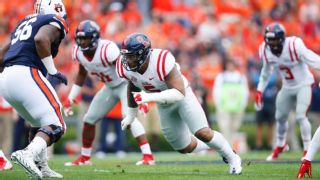 EVALUATORS SIMPLY SAY, "OK, let's hear it." Of course, teams know the gist of what happened on Dec. 13. Cops were dispatched to the Grand Hyatt Hotel in the Buckhead neighborhood of Atlanta. Nkemdiche was on the ground in front of the hotel, injured but conscious. Upstairs in room 422, there were 12 joints on a table, alongside $51 and Nkemdiche's passport and Ole Miss student ID. A double-paned window was broken. A cop asked Thomas Matthews, a friend, whether Nkemdiche had smoked pot or done any other drugs. "No, man," Matthews said, according to the police report. "He play ball, he don't smoke or nothing." A cop visited Nkemdiche in Grady Hospital. Nkemdiche told the cop he didn't remember exactly how he fell 15 feet out of the window, and he would later tell teams he was "drunk," "belligerent" and "blacked out." The cop asked Nkemdiche whether he smoked pot. He said no, that he is drug-tested regularly. Nkemdiche's eyes were neither glassy nor red, the cop noted in his report. His speech seemed normal. The cop concluded he was telling the truth, and he told Nkemdiche he was being charged with possession of marijuana because it was his room. "Watch the company you keep," the cop said before leaving. That night, Nkemdiche texted apologies to friends and family. "He still hasn't forgiven himself," says his oldest brother, Bryan. Many teams don't believe he was only drunk. Some cite a Fox Sports report that Nkemdiche was tripping on synthetic weed, which he adamantly denies. In a league in which Patriots linebacker Chandler Jones started a playoff game days after approaching a police station half naked and reportedly high on synthetic weed, it's clear "teams' attitudes are changing" toward real and fake pot, as one scout says. That's why in one team's page-long scouting report on Nkemdiche, the fall occupies only 17 words. But the incident gave teams cover to ask whatever they want. Which leads to the second question Nkemdiche is asked in every interview: "Will your brother be around?" 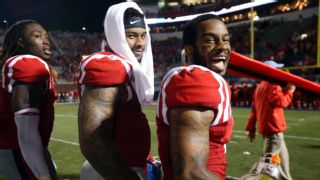 ANOTHER SPINNING FLOATER down the lane, another gutter ball. One of Nkemdiche's friends, Shaq Tables -- everyone calls him Poncho -- laughs. Nkemdiche jokingly touches his shoulder and rotates his arm, as if he's hurt. "You're not a quarterback!" Poncho says. Nkemdiche's friends like giving him a hard time. They exist to give him a hard time. Most of the friends of star athletes are glorified gofers, hangers-on, enablers. Nkemdiche could use some gofers. His friends rib him about all the things the scouts do- -- his hokey enlightenment, the tiniest of his athletic screw-ups -- but it's from a place of love rather than fear. For all his issues, most NFL coaches like Nkemdiche. He's a good kid and an amazing talent, they say. They just want to feel confident trusting him. So in the process of managing who he is and who he's expected to be -- and trying not to light millions of dollars on fire- -- Nkemdiche is volleying between subtle rebelliousness and calculated timidity. Asked for a funny story from the draft process, he chews on it for 35 seconds, trying to be as safe as possible, and his story isn't funny at all: "I'm trying to find the correct words. ... OK, OK, OK, OK, OK: Seeing how people who have never, ever came in contact with a person can have such a strong judgment of somebody." Nkemdiche wishes scouts would ask him actual football questions. When one team did ask, he rose to the whiteboard and drew defensive assignments for every position, even the secondary. "Very smart, football-wise," says a scout who witnessed it. Nkemdiche wishes scouts would ask about his impact. Ole Miss coach Hugh Freeze has made it clear that he turned around the program. Nkemdiche wishes scouts would ask him about the Alabama game from September. He played 101 snaps and was so unstoppable that he not only won national defensive player of the week but also recorded half a sack on a play in which defensive coordinator Dave Wommack says he wasn't even supposed to rush the passer. Nkemdiche recognized the play from film study and put a spin move on his opponent, a juke perfected by hundreds of hours with defensive line coach Chris Kiffin. "You don't see many players like that in your career," says Wommack, now in his 36th year of coaching. Yet as of pro day, only two teams had called Ole Miss coaches about him. Nkemdiche hasn't been in Oxford much since he was suspended from the team and turned pro, missing Ole Miss' biggest bowl game since Archie Manning was a junior. Rumors swirled that the coaches were privately distancing themselves from him. Nobody knew whether falling from a hotel would undo his legacy and thus be his legacy. But at pro day, Nkemdiche laughed with old teammates and posed for pictures with Cooper Manning. Scouts held stopwatches and recorded results from drills, but the answers they were looking for were right before their eyes. At dinner at City Grocery that night, Nkemdiche signed autographs. He left the table in the middle of a conversation because he saw an older couple he knew walking by on The Square and chased them down to give them a hug. For a day, at least, Nkemdiche seemed at home. It felt normal. He knew he was loved for a place and time, welcome in town, a reminder of how fast a seemingly insurmountable issue can evaporate. 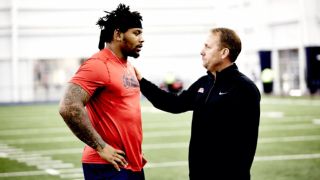 IT'S EASY TO nod along. It's easy to play armchair GM and defend the right of an NFL team to do whatever it wants under the guise of due diligence, even asking questions -- So do you like men? Is your mother a prostitute? -- that are clearly out of bounds. And so the football world managed a collective shrug when word surfaced that teams were essentially asking Nkemdiche to disavow his brother as a term of employment. Forget that it wouldn't stand in a normal workplace. Forget that nobody asked it of Bill Clinton when he ran for president. Nkemdiche would not be facing the question if not for Denzel, who teams think is a bad influence on Robert. He also never would have played football if not for Denzel. He was a sax-playing eighth-grader in 2008 when he watched Denzel, two years older, "killing it" in practice one day and decided that football looked fun. A year later, when the recession hit, their mother, Beverly, left her job as a real estate agent and moved to her native Nigeria, where she became a politician. Their father, Sunday, worked such long hours in medical research that Robert ended up living with two different coaches and one of his teammates. "He needed a stable home life," says Lenny Gregory, one of those coaches. "He needed to be fed regularly." Robert would stay with his dad on weekends. But it hurt, not having his mom. He felt he grew up without "unconditional love." So he went where it would exist: He followed Denzel to Ole Miss, where both were recruited to play football. Robert says Denzel helped raise him and had a "really good influence on me." Not everyone agrees, of course. In 2014, an Ole Miss student named Matthew Baird claimed that Denzel knocked him out at a party and that Robert, who was in high school at the time and visiting for Denzel's birthday, kicked him. Baird sued both brothers for $2 million. Nobody -- not even Baird -- testified that Robert assaulted him. The Nkemdiches countersued, claiming that their reputations had been harmed by "untrue and false" statements. They are seeking unspecified damages. Both lawsuits remain unresolved, and most teams care about the incident only to the extent that it reinforces a perception that Denzel brings trouble anywhere he goes, a harbinger of future headaches. At Ole Miss, Denzel became a flawed second-team All-SEC linebacker, mixing dazzling play with constant off-field issues. He was hospitalized twice this past season for undisclosed reasons. Robert became a superstar, a raw but unstoppable force. Still, there was always a sense that Robert fell short of a transcendent talent, like Jadeveon Clowney, because of off-field distractions. It all set up an odd dynamic that scouts are trying to unpack: Nkemdiche fashions himself an independent thinker, but teams consider him to be easily influenced, using one of those coded labels -- such as "uncoachable" -- to explain why they might not draft him in the first round. GMs have asked Nkemdiche whether he plans to help his family when he becomes rich. It feels loaded, but he says yes, of course, he is going to help his family, and in full disclosure, he tells them he considers his family to be a broad group of people -- "a tribe," "more than blood," of those who are on the "same thinking level and understanding level as me." GMs have made it clear that Denzel isn't welcome. Robert insists that Denzel won't be following him to his NFL city. What college provided he no longer needs. Ask Robert how he feels about it all -- Denzel, who couldn't be reached for this story, is living in LA -- and it's clear he's holding back. "It's not fair, man. I'm trying to see the long picture. Anywhere I go, I was going to go by myself. Get used to things by myself ... living life, being positive." At dinner one night, Nkemdiche is asked for the best advice he has received for the draft process. "Don't look for trouble." 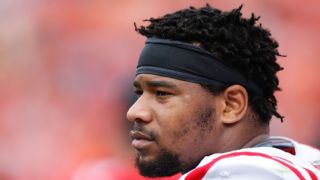 HIS HOUR OF bowling is up. Pizza crusts are piled on the table. Empty bottles of water are scattered around. Nkemdiche is in no rush to leave. It's the last time he'll be in Oxford for a while. He didn't do much except hang out with friends, play soccer and eat at two old haunts. Scouting reports say he likes going to clubs, but he stayed in a hotel outside of town. It was a business trip. The next day he'll leave for the first of 14 interviews with teams. The end of the evaluation process is near. Poncho has won three straight bowling games. Nkemdiche glances at the big-screen TV above the lane, still tuned to the draft show. Truth is, he cares. On the ticker is a list of the top players. The names pass: Laremy Tunsil ... Carson Wentz ... DeForest Buckner ... Joey Bosa ... Jared Goff ... Myles Jack ... Time seems to slow. Poncho's gloating fades into the background. Nkemdiche's name never appears. Six months ago, it would have. He is surrounded by his friends, in a town he loves, at a bowling alley where they know his name. But for a few seconds, he seems alone. He's quiet as he returns his shoes. He has a few bucks left on a game card, and he stops for pop-a-shot. He grabs Poncho's basketballs and shoots them at his own hoop. Poncho wins anyway. In the parking lot, Poncho is still jawing. Nkemdiche is not a trash-talker, but he finally fires back. "I didn't want to bully you in bowling. Character issues, you know?" Everyone laughs. As they scatter to their separate cars, Nkemdiche stops. He stands in the middle of the parking lot, unbothered as cars pass. He looks to the sky, purplish-black and dotted white. "Man, what a majestic night." Additional reporting by Shaun Assael
|

